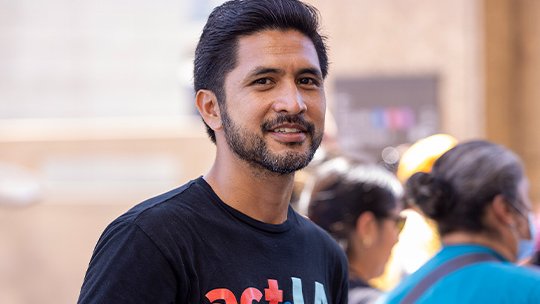Homelessness Is Down—Because We’re Keeping People Housed
For the second year in a row, homelessness in Los Angeles County is down. That’s something to celebrate.
But here’s what headlines might miss: the biggest wins in this fight aren’t just about the number of people housed—they’re about the number of people who never became unhoused at all.
The newly released 2025 Greater Los Angeles Homeless Count shows a 14% drop in unsheltered homelessness countywide over two years, and an even more dramatic 18% drop in the City of Los Angeles. These numbers prove what we already know: when we invest in the frontline community organizations and programs that prevent eviction and keep people stably housed, we get real results.
Prevention Works—Even When It’s Hard to See
When people stay housed, they don’t appear in the statistics. That’s what makes prevention so powerful—and so easy to overlook. Yet it's exactly what drives the most sustainable progress.
Programs like Stay Housed LA, a right-to-counsel partnership between the City and County of Los Angeles administered by Liberty Hill Foundation and the Legal Aid Foundation of Los Angeles, are a key reason we're seeing these positive trends.
Since its launch in 2020, Stay Housed LA has reached over 2 million tenants, connected more than 27,000 people to legal services, and hosted nearly 1,500 workshops to educate renters on their rights and resources. In collaboration with dozens of grassroots partners, this program is preventing evictions every day—long before a person is at risk of losing their home.
ULA: Community-Driven, Data-Proven
- The United to House LA (ULA) measure—voter-approved, community-led, and equity-focused—is another major driver of these gains.
- More than 10,000 Angelenos have been able to stay in their homes through ULA-funded rental assistance and income supports.
- Nearly 500 seniors, families, and vulnerable renters have received direct emergency funds.
- Over 100,000 tenants have been educated on their rights.
- And ULA is helping build 795 affordable homes, offering permanent solutions for those still experiencing homelessness.
These are not theoretical impacts. These are families kept together. Seniors avoiding displacement. Communities gaining stability. These are the quiet victories that add up to a real drop in homelessness.
This is also the story of what's possible when we invest in prevention. Encampment removals and emergency shelters may grab headlines—but they are temporary, expensive, and come far downstream in the cycle. We need to pull people from the river, yes—but we must also stop them from being pushed in to begin with. That means tackling the root causes: skyrocketing rents, underpaid workers, structural racism, and the commodification of housing itself.
What’s at Stake Now
We’ve shown what works. But progress is fragile. State and federal budget cuts threaten many of the very programs that have made this success possible.
And while headlines may focus on encampment cleanups or short-term housing placements, Liberty Hill is here to remind everyone that long-term success depends on keeping people in their homes in the first place.
With new funding streams from Measure A on the horizon, we have a once-in-a-generation chance to push even further—to prevent chronic homelessness before it starts.
How We Change the Narrative
We know that prevention isn’t always visible. But now is the time to elevate the community-led solutions behind the progress, and to make sure grassroots organizers, legal advocates, and renters themselves are part of the public conversation.
We need to shift the frame: from triage to transformation. From expensive last-resort interventions to proven, people-powered systems of care. From "fixing homelessness" to fixing the broken systems that cause it.
Liberty Hill is working with our partners to shape this story—through the press, in funder spaces, and in citywide strategy conversations—so the credit goes not just to high-profile elected officials, but to the organizers and advocates who have made this drop in homelessness possible.
Join Us. Share the Story. Sustain the Progress.
Learn more about how you can support housing justice in Los Angeles on our webpage.

